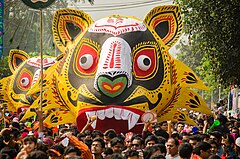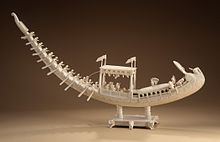
Back باهيلا بيشاك Arabic পহেলা বৈশাখ Bengali/Bangla Παχέλα Μπαϊσάχ Greek Pohela Baiŝaĥ Esperanto Pohela Boishakh Spanish Pohela Boishakh Basque पहेला वैशाख Hindi Pahila Baishakh HIF Բենգալական նոր տարի Armenian Pohela Boishakh ID
| Pohela Boishakh পহেলা বৈশাখ | |
|---|---|
 Pohela Baishakh celebration in Dhaka, Bangladesh | |
| Official name | Pohela Boishakh[1] |
| Also called | Pahela Baishak, Pahela Boishak, Poila Boishak (পহেলা বৈশাখ) |
| Observed by | Bengalis |
| Type | Social, cultural and national festival |
| Celebrations | Boishakhi Mela (fair), gift-giving, visiting relatives and friends, songs, dance |
| Date | 14 April (Bangladesh) 15 April (India) |
| Frequency | Annual |
| Related to | South and Southeast Asian solar New Year |
| Part of a series on the |
| Culture of Bengal |
|---|
 |
| History |
| Cuisine |
Pohela Boishakh (Bengali: পহেলা বৈশাখ)[n 1] (Phonetics: pohela bōiśakh) is the Bengali New Year celebrated on 14 April in Bangladesh and 15 April in the Indian[2] states of West Bengal, Tripura, Jharkhand and Assam (Goalpara and Barak Valley). It is a festival based on the spring harvest—which marks the first day of the new year in the official calendar of Bangladesh.[3][4][5][6]
The Pohela Boishakh has its origins in the Mughal Empire, representing the proclamation of tax collection reforms under Akbar.[7] Its celebration is rooted in the traditions of the Mahifarash community of Old Dhaka.[8][9] Presently, it is largely a secular holiday for most celebrants and enjoyed by people of several different faiths and backgrounds.
The festival is celebrated with processions, fairs and family time. The traditional greeting for Bengalis in the new year is শুভ নববর্ষ "Shubho Noboborsho" which is literally "Happy New Year". The festive Mangal Shobhajatra is organised in Bangladesh. In 2016, the UNESCO declared this festivity organised by the Faculty of Fine Arts, University of Dhaka as a cultural heritage of humanity.[10]
- ^ Nubras Samayeen; Sharif Imon (2016). Kapila D. Silva and Amita Sinha (ed.). Cultural Landscapes of South Asia: Studies in Heritage Conservation and Management. Taylor & Francis. pp. 159–160. ISBN 978-1-317-36592-1.
- ^ "Poila Boishakh 1429: Why Bangladesh & West Bengal Celebrate Bengali New Year On Different Days". ABP News. 14 April 2022. Archived from the original on 17 March 2024. Retrieved 14 April 2022.
- ^ Kapila D. Silva; Amita Sinha (2016). Cultural Landscapes of South Asia: Studies in Heritage Conservation and Management. Taylor & Francis. pp. 159–162. ISBN 978-1-317-36592-1.
- ^ "BBC – Religion: Hinduism – Vaisakhi". BBC. Retrieved 22 January 2012.
- ^ Crump, William D. (2014), Encyclopedia of New Year's Holidays Worldwide, MacFarland, page 114.
- ^ Gordon Melton, J. (13 September 2011). Religious Celebrations: An Encyclopedia of Holidays, Festivals, Solemn Observances, and Spiritual Commemorations [2 volumes]: An Encyclopedia of Holidays, Festivals, Solemn Observances, and Spiritual Commemorations. Abc-Clio. ISBN 9781598842067.
- ^ Chakrabarti, Kunal (2013). Historical dictionary of the Bengalis. Shubhra Chakrabarti. Lanham, [Maryland]: Scarecrow Press. ISBN 978-0-8108-8024-5. OCLC 861692768.
- ^ Akram, Ridwan (14 April 2017). বৈশাখী খাবারের সুলুক সন্ধানে [In search of Boishakhi banquets]. Bdnews24.com (in Bengali).
- ^ Sahebul Haq, Sheikh. "মাহিফরাসের দাওয়াত টু পয়লার ইলিশ-পান্তা" [From the banquets of the Mahifarash to the Ilish-Panta of Poila Boishakh]. Ei Samay Gold (in Bengali).
- ^ Mangal Shobhajatra on Pohela Boishakh. UNESCO.
Cite error: There are <ref group=n> tags on this page, but the references will not show without a {{reflist|group=n}} template (see the help page).